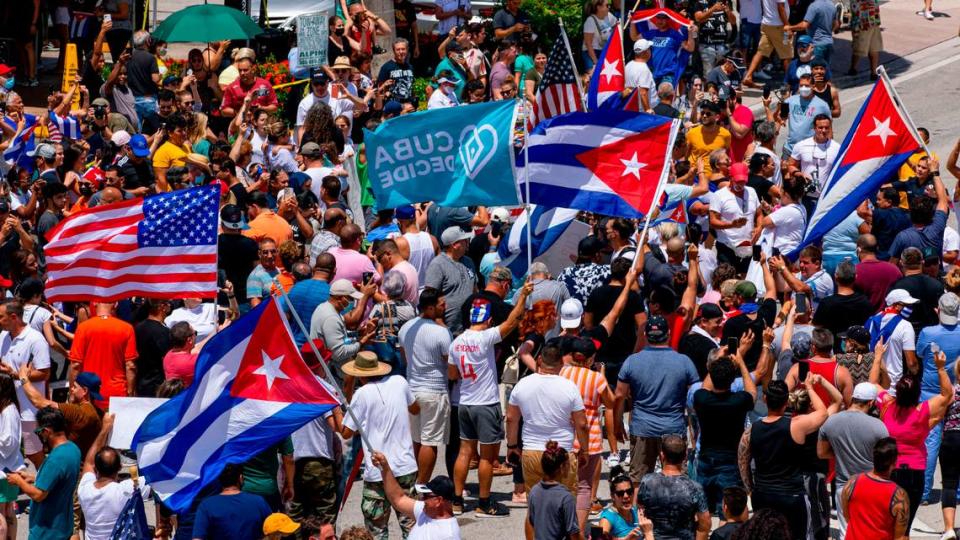Thousands of people flood streets near Little Havana to support protesters in Cuba
About 5,000 people erupted in protest around the Little Havana area Sunday night in support of protests in Cuba calling for the end of Cuba’s communist government amid shortages of food, basic necessities and vaccines.
Miami’s demonstration outside the Versailles Restaurant in Little Havana — which began as a caravan across the city — was a show of support for the many unprecedented protests Sunday in cities and towns across Cuba, where people demanded freedom and called for the end of the communist dictatorship on the island.
“The Cuban people are on the streets, so Miami will too,” thousands of demonstrators, draped in Cuban flags, chanted as others banged on pots and pans.
“This moment is historic. That hasn’t happened in decades. Today the Cuban people have demonstrated that they want change and they want it now,” said Alexander Otaola, a Cuban-American social media influencer and political activist.

Miami police shut down Southwest Eighth Street from 32nd Avenue to 37th Avenue as the crowds multiplied. Miami Police Chief Art Acevedo told the Miami Herald that zero arrests were made and that there was one medical emergency, a seizure.
“It’s been a peaceful demonstration,” Acevedo said. “Our city is exercising its First Amendment right.”
There are THOUSANDS of people outside @VersaillesMiami in Miami right now showing solidarity with Cuba. @MiamiHerald
Warning: Explicit lyrics pic.twitter.com/GymOMPFxXc— Monique O. Madan (@MoniqueOMadan) July 12, 2021
In a video posted by the Miami Police Department, police officers could be seen standing with demonstrators as they chanted “Freedom!” “Down with Communism!” and “Patria y Vida” — Homeland and Life — which has become a battle cry among activists after a viral music video turned the revolutionary slogan “Homeland or Death” on its head.
Last time Cubans took to the streets to protest against the communist government was in 1994 and Fidel Castro was alive. But the uprising, known as the Maleconazo, only took place in Havana and didn’t last long, as the former Cuban leader quickly turned the demonstrations into a massive exodus after he opened Cuba’s maritime borders. Thousands of Cubans left the island in makeshift boats and rickety rafts, in what became known as the balsero crisis.

“This is the token symbolism of freedom, finally an opportunity after 62 years to get rid of everything that we loathe in the country: oppression, lack, totalitarianism,” said Republican Florida Sen. Ileana Garcia, a daughter of Cuban immigrants.
Earlier in the day, Garcia and Miami Republican U.S. Rep. Maria Elvira Salazar asked the Biden administration to intervene by tightening the embargo against the regime, but by also sending humanitarian aid to Cuba.
Julie Chung, the State Department’s Acting Assistant Secretary for the Bureau of Western Hemisphere Affairs, said on Twitter that Cubans are exercising “their right to peaceful assembly to express concern about rising COVID cases/deaths & medicine shortages.”
Sixteen-year-old Karen Costa, who emigrated from the island to Miami with her mother six years ago, echoed Chung.
“My dad, my brother, my sister, they are still there... I haven’t heard from them in days. The internet is blacked out. People are being killed by the government for speaking their truth,” Costa said before breaking down in tears.
“When will this nightmare end? When?”

